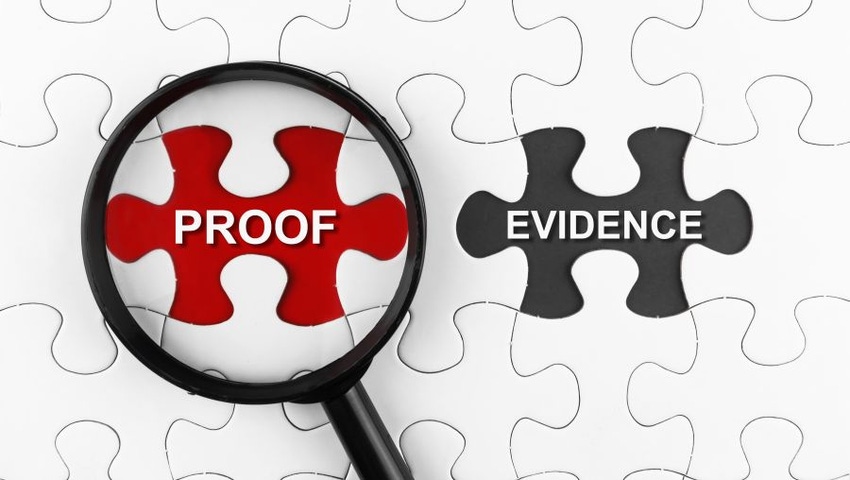Substantiation is an action word and represents the backbone of advertising and marketing, especially in the sports supplement market where research and benefit claims are important to consumers.

by Douglas Kalman, Ph.D., R.D.
The word “substantiation" carries a lot of weight. In fact, substantiation itself is an action and the word is classified as a verb. An action verb. Therefore, we also can think of the word substantiation to be proactive, versus being reactive. The definition of substantiation includes three aspects, which underscore why this is so important of those who do business in the nutrition sector. (Although, one can argue, this is just as important for anyone who sells something in general or other commerce.)
Before we fully define substantiation, it is also good to know that the general term originated in the mid-1600’s from the Latin as the word, substantiātus.
Substantiation is essentially defined three ways:
to establish by proof or competent evidence
to give substantial existence to
to affirm as having substance; give body to; strengthen
Substantiation also can be thought as the backbone off of which a company bases its advertising and marketing. In the United States, under FTC and now even state laws, one must have what is believed to be competent and reliable evidence to support an overt marketing claim or inferred claim.
While most people understand substantiation through its literal definition, FTC actually published, way back in 1972, what are popularly known as the “Pfizer Factors." These factors helped to define how the agency viewed advertising and marketing as related to the product and potential impact on consumers. The Pfizer Factors are what also, in general, helps FTC decide if there is a reasonable basis for a claim. The Pfizer Factors are: 1) the type of product, 2) the type of claim, 3) the benefit of a truthful claim, 4) the ease of developing substantiation for the claim, 5) the consequences of a false claim, and 6) the amount of substantiation experts in the field would consider reasonable.
FDA and FTC work together, when appropriate, on “policing" the industry. This includes reviewing labels for claims, implied claims and substantiation. In 2008, FDA attempted to further define substantiation by releasing a well-read guidance document. In fact, FDA basically stated it views the following four parameters as the foundations of substantiation: 1) the meaning of the claim(s) being made; 2) the relationship of the evidence to the claim; 3) the quality of the evidence; and 4) the totality of the evidence. FDA’s guidance document attempted to further the understanding of what substantiation is by sharing examples that are typical in the supplement industry.
Defining what level of substantiation is adequate has become an issue that companies that want to be proactive are grappling with, considering the various takeaways from FDA’s and even FTC’s outreach to industry, as well as outcomes from litigation brought by FTC and other parties against natural products companies.
A successful business is one that generally minimizes its risks, while also making sure it runs efficiently. One way to be efficient, cost-conscious and smart, especially if you are a company that markets aggressively, is to have a substantiation assessment done prior to your product launch. This is sometimes called a “CARSE" assessment. In other words, one can prevent legal issues upfront by creating a live dossier that covers why your product and related claims are based on Competent and Reliable Scientific Evidence (CARSE).
There are several considerations for assessing the basis for your implied or direct claims. First, if you believe you have reasonable basis for your product claim based upon one published ingredient study, is that enough? Do you need studies at all if you have content area experts who “endorse" your claims as being reasonable? What happens if you are challenged on the quality of the data that you rely upon for your marketing and advertising? What about the cost of creating or obtaining substantiation, can you predetermine what it might cost versus what legal issues may cost you? And, is it acceptable to look for substantiation after you have been hit with a FTC issue or civil lawsuit?
As you can see, substantiation definitely is a verb, as it is about action.
Douglas Kalman, Ph.D., R.D., is a research scientist at QPS, a contract research organization that conducts clinical trials in the pharmaceutical, medical device and nutrition industries. In addition, Dr. Kalman is with Substantiation Sciences (SubstantiationSciences.com), a consultancy that helps companies realize their intellectual property and marketing substantiation goals.
Substantiation will be the focus of Doug Kalman’s presentation at SupplySide West, as part of the Sports Nutrition Workshop, scheduled for Tuesday, Sept. 26, 1:30 to 4:30pm. This session will include education, guidance and actions you can take right now to be in the best position to have substantiated products.
About the Author(s)
You May Also Like






.png?width=800&auto=webp&quality=80&disable=upscale)